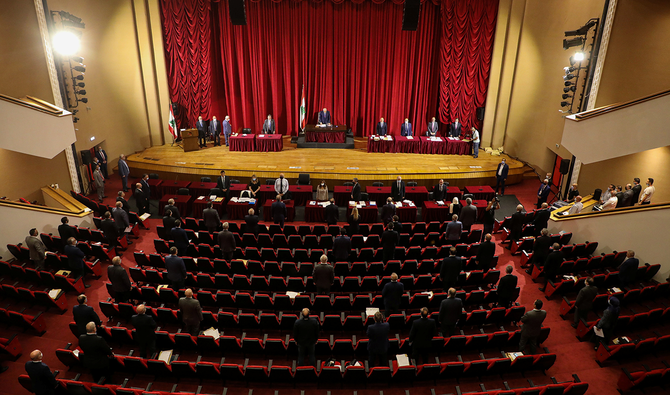BEIRUT: Inmates at Lebanon’s Roumieh Central Prison threatened to kill themselves on Wednesday in a bid to pressure parliament over an amnesty law.
Video footage from inside the prison showed them threatening to hang themselves if the law was not passed.
“Yes, we have stolen, but that was due to hunger and poverty,” said one inmate. “The big thieves are untouchable, and only those who steal an egg get prosecuted. The one who killed former PM Rafic Hariri has been acquitted.”
Another inmate wrapped cloth around his neck, preparing a noose. “If they do not approve the general amnesty, our lives do not concern us,” he said. “May I rest in peace.” Others were quick to stop him from taking his own life.
The families of detainees demanded amnesty for their loved ones and held a sit-in near where parliamentarians were meeting to discuss the law.
But disagreements among parliamentary blocs meant the proposed law was referred to a committee.
Another point of difference during the session was the Illicit Enrichment Act. Parliament Speaker Nabih Berri said the matter required a session to amend the constitution in order to waive immunity for everyone.
He told Parliament: “As long as there is sectarianism and sects, progress cannot be made in Lebanon. Ministers have been arrested, and I was the one who turned them in, and no one bid on it.”
The Free Patriotic Movement (FPM) said the bill’s wording affected everyone including ministers and MPs, while the Future Movement believed it did not because they enjoyed immunity.
The bill was approved with an amendment upon request from the Future bloc, which demanded the removal of the phrase “waiving the immunity of the prime minister and the ministers” and replacing it with: “The offense of illicit enrichment is subject to the jurisdiction of the judicial judiciary.”
The act has been a demand of the civil movement for about a year and one of the reform terms required of Lebanon.
FPM head Gebran Bassil, who is in quarantine due to having coronavirus, hailed the passing of the bill as an achievement for his parliamentary bloc “on the path of holding every public service accountable.”
But Future bloc MP Hadi Hobeich said the act did not include parliamentarians, ministers, and presidents, and that this matter required a constitutional amendment.
“The immunity of an MP is constitutional, and illicit enrichment is a criminal offense,” he said. “The current text did not extend to the prime minister and ministers, and we want an amendment to extend this act to the president, the prime minister, speaker of parliament, and the employees.”
The fate of Lebanon’s government – or rather the formation of a new one – still hangs in the balance and was further complicated by a speech from Hezbollah leader Hassan Nasrallah on Tuesday night.
“Hezbollah wants to participate in the government, and we want to choose those who represent the Shiites in it,” Nasrallah said. “The goal is not that the Shiites are represented and that they take this portfolio or that. Rather, what is required is to know who controls the decision of these Shiites.”
He also declared that the party’s presence in government was about having access to the conditions that the IMF would impose in exchange for financial aid to Lebanon.
Prime Minister-designate Mustapha Adib, who was tasked with forming the government, resigned after Hezbollah and the Amal Movement insisted on taking the finance portfolio and naming all the Shiite ministers in the government.
Their demands undermine an initiative from France, which has called for a mini-government comprising specialized ministers who have nothing to do with the political parties in power.
Former MP Fadi Karam, the secretary of the Strong Republic Parliamentary bloc, criticized Nasrallah.
“The rescue initiatives of Lebanon’s friends have their conditions and steps, and they will not be according to your demands and instructions,” he said. “The initiatives basically emerged to rescue Lebanon from the disasters caused by your policies, your axes, and the corruption of your authorities. You want it to rescue you, and that is why you held the people of Lebanon hostage, but these initiatives are here to rescue the people from you.”
MP Nadim Gemayel reminded Nasrallah of his refusal to declare Hassan Diab’s government, which resigned in August after a massive explosion in Beirut, as Hezbollah’s.
“Here is Hezbollah today telling the whole world that it wants to participate in the government to protect the resistance and rescue the country,” he said. Hezbollah’s weapons were “illegal” and the cause of the country’s “destruction and devastation.”
“Your words are proof of your determination to eliminate what is left of Lebanon,” he added.






















